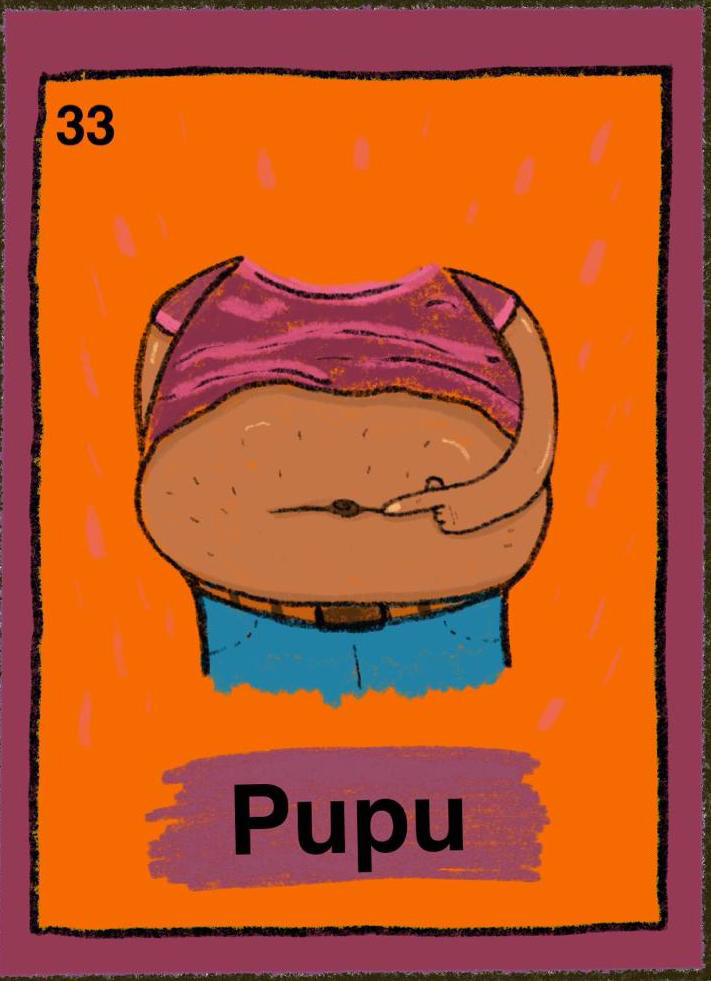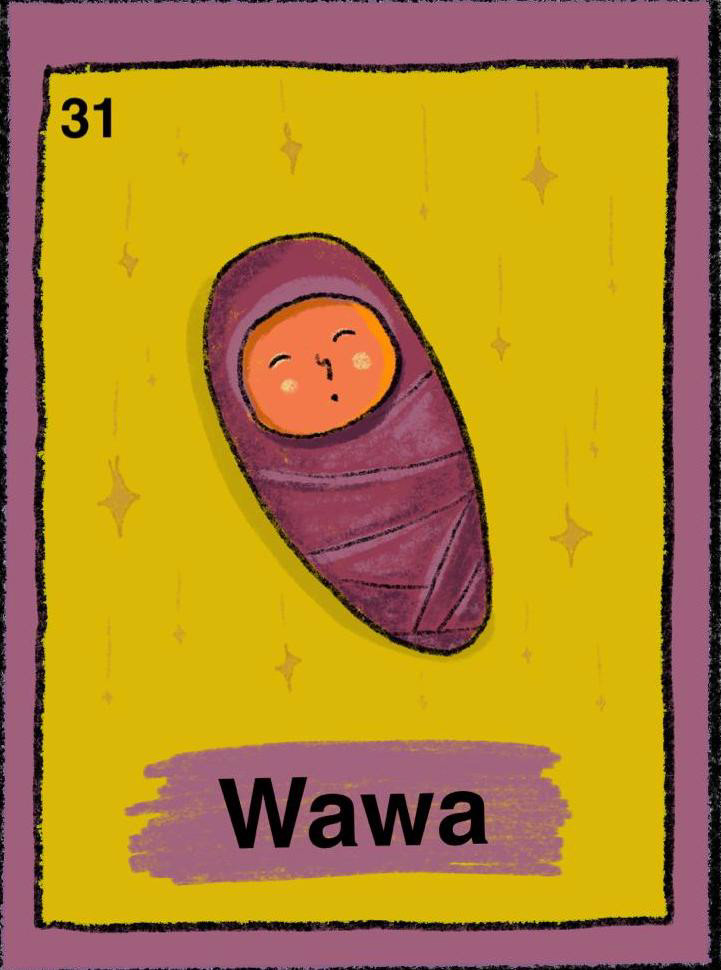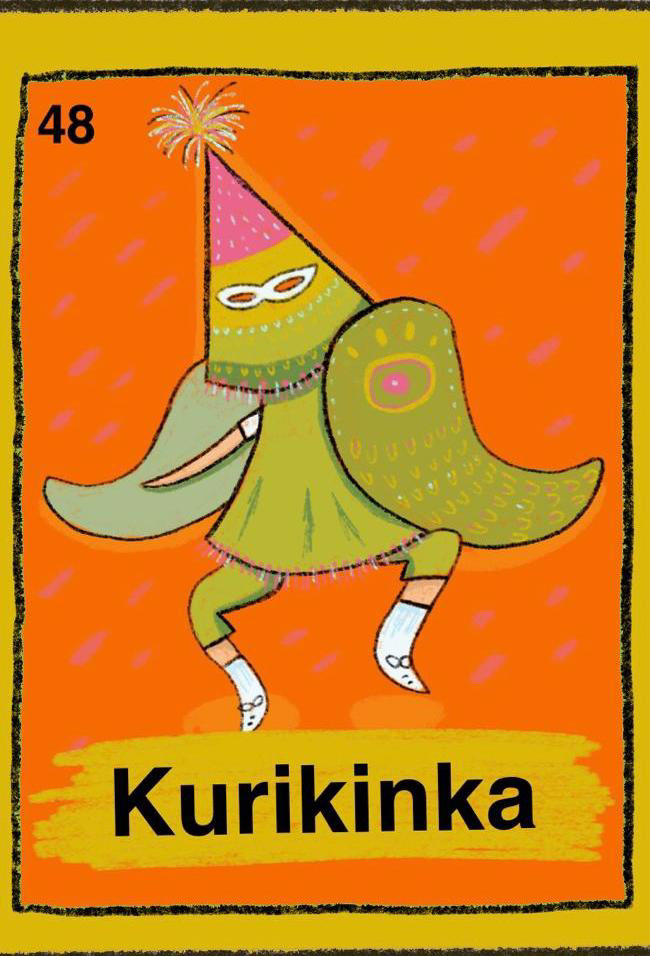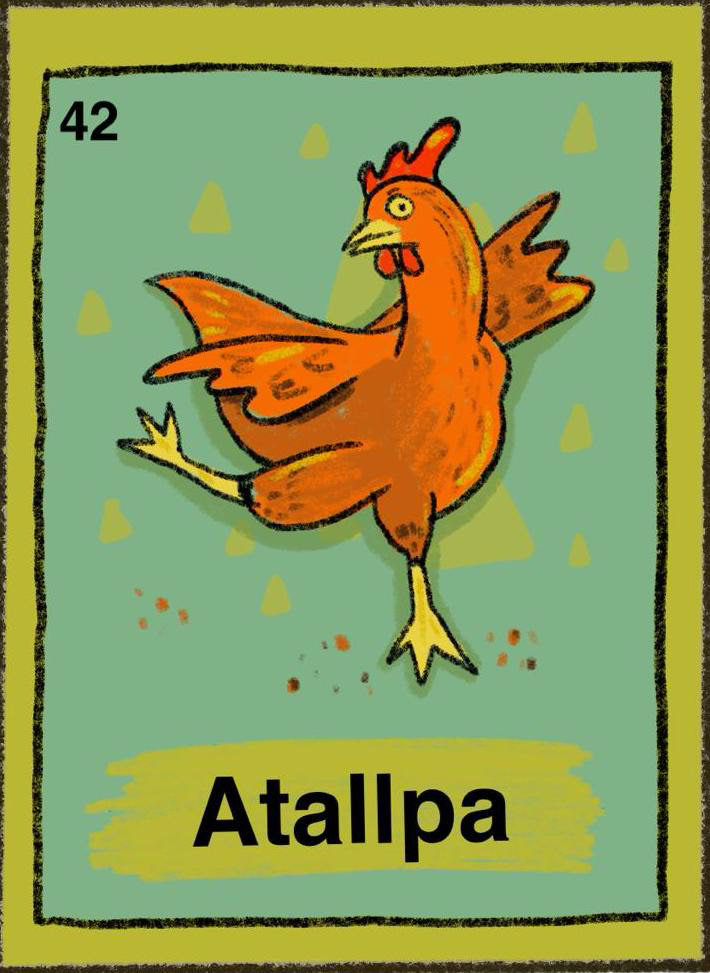The game comes with:
+ 10 boards
+ 54 cards
+ manual in Kichwa and Spanish.
+ 10 boards
+ 54 cards
+ manual in Kichwa and Spanish.
(Scroll down for English manual)
2 to 10 Players
1. Hand out one boards to each player.
2. Take the top card out of the deck and read it out loud.
3. Players, find the same card figure in your board.
4. If you have it, mark it with a bean.
5. Fill out the card and shout:
ACHIK PUKLLAY to win!
HAVE FUN PLAYING!
🍃
ACHIK = light PUKLLAY = game,
This is a self financed project, inspired in Loteria Mexicana. It is a project I've been illustrating over a year. It's a fun way to create content to encourage people to learn Kichwa language.
This is a self financed project, inspired in Loteria Mexicana. It is a project I've been illustrating over a year. It's a fun way to create content to encourage people to learn Kichwa language.
Kichwa is one of the native languages use in South America. It has its variation from Quechua, but both come from the same root. (https://en.wikipedia.org/wiki/Kichwa_language)
I hope you have fun!!!




ACHIK PUKLLAY - Handout
ACHIK PUKLLAY
Achik = light Pukllay = game
A game inspired by the Mexican Loteria; similar to Bingo.
It can be played with family, friends, with little boys and girls at school. Everyone can play it.
Little kids who can't read are welcome to play it too, since they can look at the illustrations.
A game inspired by the Mexican Loteria; similar to Bingo.
It can be played with family, friends, with little boys and girls at school. Everyone can play it.
Little kids who can't read are welcome to play it too, since they can look at the illustrations.
CONTAINS
- 54 cards
- 10 boards.
- 54 cards
- 10 boards.
HOW TO PLAY
- One board is dealt with each player (up to 10 players. Or players can share one board).
- The group will choose the Kawak or singer to shuffle and draw the cards.
- Once the deck of cards has been shuffled, the Kawak will place the cards face down on the table.
- Kawak will draw the first card from the deck and read aloud the word on the card in Kichwa and English. You can use the word list in the handout to help you.
- Players will look at their board. Whoever has the same figure as the card drawn by the Kawak will mark it with a token, seed, or whatever they have on hand (do not scratch the board to be able to play again).
- The Kawak draws the next card; the players who have the figure on their board will mark it.
- Whoever fills their entire board and shouts ACHIK PUKLLAY!!! wins the game.
- The group will choose the Kawak or singer to shuffle and draw the cards.
- Once the deck of cards has been shuffled, the Kawak will place the cards face down on the table.
- Kawak will draw the first card from the deck and read aloud the word on the card in Kichwa and English. You can use the word list in the handout to help you.
- Players will look at their board. Whoever has the same figure as the card drawn by the Kawak will mark it with a token, seed, or whatever they have on hand (do not scratch the board to be able to play again).
- The Kawak draws the next card; the players who have the figure on their board will mark it.
- Whoever fills their entire board and shouts ACHIK PUKLLAY!!! wins the game.
TIPS TO PLAY
- Read and look at the illustrations on your board before starting the game to familiarize yourself with the words.
- When the Kawak draws the cards, look at the illustration of the card, the name, and its number.
- If you don't remember the phrase ACHIK PUKLLAY, read it on the back of the board.
- When the Kawak draws the cards, look at the illustration of the card, the name, and its number.
- If you don't remember the phrase ACHIK PUKLLAY, read it on the back of the board.
SOME FACTS ABOUT THE KICHWA OF THE GAME
- Reading Kichwa from English can be a little bit tricky since phonetics is mainly similar to Spanish. However, the good part is that vowels have just one sound; H sounds just like in English; LL can sound like an L or a J (depending on the accent);
- The words are written around the unified Kichwa.
- There is Kichwa and Quechua. “Just as the Romance language family is made up of multiple languages, so is Quechua…” https://otavalo.org/quichua-o-quechua/
- The accent of the words in Kichwa goes on the second last syllable of the word.
- Kichwa is an agglutinative language. A word is made of several words or morphemes, such as Kiwayaku, Kiwa-herb, Yaku-water; it is interpreted as tea or herbal infusion.
- In some words, the K represents the G, as in Chanka, it is pronounced Changa. The same with Punku, Akcha, Kurikinka, Shunku.
- In some words, the T represents the D, as in Kinti, it is pronounced Kindi. The same with Tanta.
- In some words, the P represents the B, as in Pampa (valley), it is pronounced Pamba. However, these words are not in the game.
- Some objects may have a different name or sound, as in English from United States, England, Australia, Canada... Therefore, it is essential to be open to learn from those who speak the Kichwa language.
- The words are written around the unified Kichwa.
- There is Kichwa and Quechua. “Just as the Romance language family is made up of multiple languages, so is Quechua…” https://otavalo.org/quichua-o-quechua/
- The accent of the words in Kichwa goes on the second last syllable of the word.
- Kichwa is an agglutinative language. A word is made of several words or morphemes, such as Kiwayaku, Kiwa-herb, Yaku-water; it is interpreted as tea or herbal infusion.
- In some words, the K represents the G, as in Chanka, it is pronounced Changa. The same with Punku, Akcha, Kurikinka, Shunku.
- In some words, the T represents the D, as in Kinti, it is pronounced Kindi. The same with Tanta.
- In some words, the P represents the B, as in Pampa (valley), it is pronounced Pamba. However, these words are not in the game.
- Some objects may have a different name or sound, as in English from United States, England, Australia, Canada... Therefore, it is essential to be open to learn from those who speak the Kichwa language.
SHIMIKUNA
Words in Kichwa an its meaning
1. KINTI - Hummingbird.
2. YANUK - Cook.
3. RAKACHA - Carrot.
4. KUYCHI - Rainbow.
5. MISHKI MAMA - Honey bee.
6. KUCHA - Lagoon, lake.
7. AMARU - Snake.
8. KILLA - Moon.
9. KUSHIPATA - Priest. There was no concept of father or priest; it adopts several names according to each community.
10. INTI - Sun.
11. *SARA - Corn.
12. *CHAKANA - Bridge. Andean Cross.
13. MAMA RUKA - Thumb
14. WASI - House. Closed place that protects us from the elements.
15. TSUTU - Bump. It can also refer to bulky shaped objects in nature..
16. KIWA - Herb.
17. RUMI - Stone.
18. CHALLWA - Fish. In unified Kichwa it is used to refer to fish in general. In the Amazon, challwa is used to refer to the bocachico.
19. PUNKU - Door, Portal.
20. *MUKAWA - Bowl for drinking, traditional from the Amazon.
21. *KIPU - Knot. A registration, accounting and messaging system used in the Andean world. (https://www.bbc.com/mundo/noticias-50075542)
22. PUYU - Cloud.
23. UCHU - Chili Pepper.
24. KAMCHA - Toasted corn.
25. KANCHA - Yard. Word adopted in Spanish to indicate a space dedicated to the practice of sports. In this game, is represented what is interpreted in Spanish so that people notice the use of Kichwa words in everyday life.
26. SACHA - Jungle, forest.
27. URKU - Mountain.
28. LLUCHU-UMA - (Naked head) Bald.
29. AKCHA - Hair.
30. MISI or Mishi. - Cat.
31. WAWA - Baby.
32. TANTA - Bread.
33. PUPU - Belly button.
34. WALLKA - Necklace.
35. TAMYA - Rain.
36. SISA - Flower.
37. NINA - Fire.
38. MAKI - Hand.
39. CHANKA - Leg.
40. API - Colada, soup or porridge.
41. KATSU - Beetle. There are other names depending on the type of beetle.
42. ATALLPA - Chicken.
43. *RAYMI - Celebration. It is also interpreted as a party.
44. MUYU - Seed.
45. CHIRI - Cold. Its opposite is Kunuk which means heat or hot.
46. KUYLLUR - Star.
47. CHIWILLA - Pineapple.
48. *KURIKINKA - Bird of the Andes Dancer from Ecuador who walks in the parades representing this little bird. In this game the character is represented and not the bird. In Spanish it is known as Curiquingue.
49. KIWAYAKU - (Herb water) Tea, herbal infusion.
50. TULLU - Bone.
51. MUCHA - Kiss.
52. SHUWA - Thief.
53. *SHUNKU - Heart.
54. KUYI - Guinea pig
How many of these words did you already know?
* I encourage you to further investigate the meaning of these words.
Ilustration & Creation: Sofia Silva
Kichwa: Maestro Rasu Paza
Graphic Design & Layout: Paulo Castillo
Printing: Argenis Godoy
Phrases to play: Esteban Michelena
Thanks to: Ernie Ayala :) Santiago Ruales, Silva Gonzalez,
Spillman, Ayala families.
SELF FINANCED PROJECT
Produced in San Diego, California & Quito, Ecuador
SAN DIEGO, CA: find Achik Pukllay at Libelula Books Co
950 South 26th Street. San Diego, CA
If you are somewhere else, please click the button at the end of this page and send me an e-mail or whatsapp :)